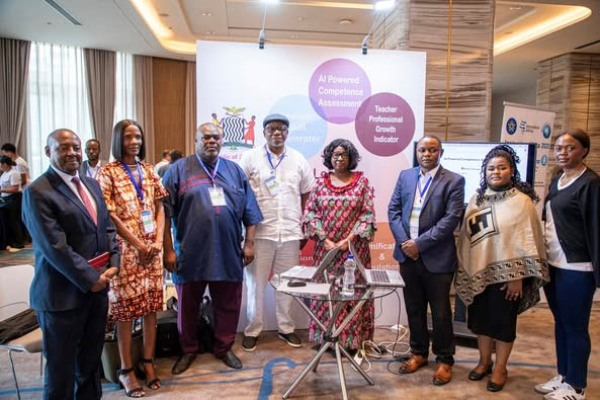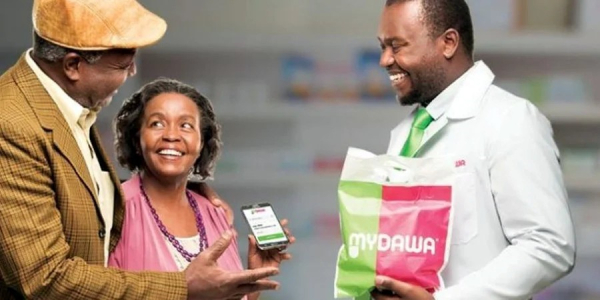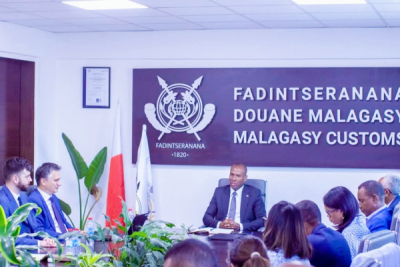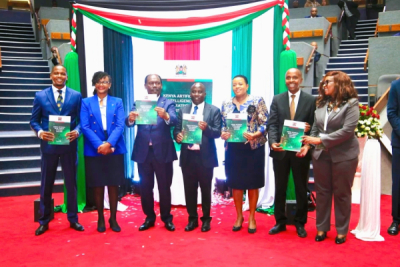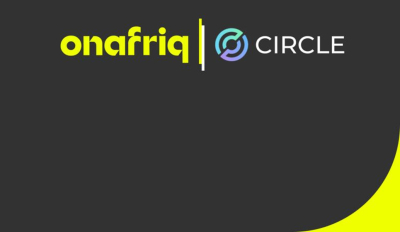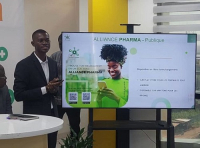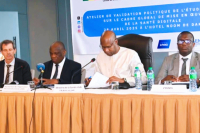Digital ID systems reduce bureaucratic inefficiencies and corruption. By digitizing identity verification, governments can cut down on duplicate registrations and ghost beneficiaries in public programs.
Zambia is looking to Ethiopia as a model for implementing its national digital identification system, citing the East African country’s successful home-built approach as a blueprint for locally driven innovation. This was disclosed by Mr. Percy Chinyama, National Coordinator of Smart Zambia, during the Africa Innovation Conference in Addis Ababa. Emulating this model could help Zambia strengthen security by ensuring proper citizen identification and preventing identity fraud.
According to the official press release issued by the Zambia Embassy in Ethiopia on April 29, 2025, Mr. Chinyama highlighted the Zambian government’s strategic shift away from proprietary systems in favor of homegrown digital infrastructure. Ethiopia’s locally developed digital ID framework was cited as a prime example of what Zambia aims to replicate.
Ethiopia’s Fayda Digital ID initiative is emerging as a leading example on the continent because of several factors. Unlike many systems that rely heavily on foreign proprietary solutions, Ethiopia’s digital ID is developed in-house with open-source technology, ensuring sustainability, adaptability, and reduced long-term costs.
The Fayda system uses biometric authentication and de-duplication, ensuring each citizen has one unique, verifiable ID. It complies with the MOSIP (Modular Open Source Identity Platform) standards, making it interoperable with other systems globally.
The UNDP reports that while 89% of Zambians possess paper-based National Registration Cards, only 1.5 million out of an estimated 9 million have been enrolled using biometric data. The finding underscores a major digital identity gap. This limits citizens’ access to essential digital services and undermines efforts toward financial and social inclusion.
Ethiopia’s home-grown biometric digital ID system, Fayda, offers a valuable model for Zambia to transition from insecure, paper-based IDs to a robust, inclusive digital identity infrastructure. Adopting this model could help Zambia improve service delivery, reduce fraud, and ensure more citizens can fully participate in the digital economy.
Hikmatu Bilali
MYDAWA, a digital health platform in East Africa, has raised new funding to expand its services and improve access to essential medicines across the region. The investment will support regional growth, AI-powered service upgrades, and the scale-up of MYDAWA’s hybrid “Bricks-and-Clicks” model, which combines online health services with physical pharmacy support.
The funding round includes global healthcare investors such as IFU, Alta Semper, AAIC Investment, Creadev, and Ohara Pharmaceutical Co., Ltd.
The funds will also expand chronic care support, enhance digital tools, and reduce patient costs through smarter logistics and inventory systems. MYDAWA recently strengthened its presence in Uganda through the acquisition of Rocket Health.
- IMF supports Madagascar's AI-driven customs reform, with experts training officials on integrating AI to boost efficiency and transparency.
- AI tools already in use—such as image analysis and risk assessment systems—helped increase customs revenues by 68% year-on-year in January 2025.
Madagascar's customs authority is currently receiving technical support from the International Monetary Fund (IMF) to accelerate its digital transformation. Two specialists, Victor Budeau and François Chastel, began their mission in Antananarivo on Thursday, April 24th. Their assignment, scheduled to conclude on Wednesday, May 7th, includes intensive training focused on incorporating artificial intelligence (AI) into customs procedures.
The objective is to improve the efficiency, accuracy, and transparency of operations. During a working session, the Director General of Customs, Ernest Zafivanona Lainkana (pictured, center), underscored the significance of centralizing data within a unified database to fully harness the potential of AI. He also affirmed that this technology must now become a fundamental component of customs tools.
This initiative is not merely an experiment but rather part of an ongoing strategy. The customs administration is already using several AI-driven solutions: automatic image analysis (RESNET), Smart Scanning, and the Enhanced Risk Assessment (ERA) system. These tools have contributed to a 68% increase in customs revenues in January 2025 compared to January 2024.
Given these positive outcomes, the IMF has designated Madagascar as a pilot project in Africa for the integration of AI into customs services. This strategic recognition could lay the foundation for a continent-wide strategy. By 2029, Madagascar's customs authority aims to extend these technologies to additional control sectors, strengthen its digital infrastructure, and share its expertise at the regional level.
- Kenya launches 2025–2030 national AI strategy focused on ethical, inclusive, and innovation-driven adoption across key sectors like health, agriculture, and public services.
- Strategy emphasizes data sovereignty and responsible governance, outlining future regulations on privacy, cybersecurity, and cross-border data flows.
- Plan aims to position Kenya as a regional AI leader, aligning with African Union initiatives and aiming to attract global partnerships and investment.
Kenya has unveiled its inaugural national artificial intelligence strategy, covering the years 2025 through 2030. The document articulates a distinct vision for the ethical, inclusive, and innovation-led integration of AI technologies. This initiative forms part of the nation's wider digital transformation agenda and serves as a clear indicator to international technology firms closely observing regulatory developments within emerging markets.
While formulated at the national level, the strategy mirrors a broader trend: the adaptation of global AI governance norms to the specific circumstances of emerging economies. It organizes Nairobi’s ambitions around several core pillars, encompassing infrastructure development, data sovereignty, sector-specific applications, and responsible innovation. The strategy also lays the groundwork for future legislative action.
Data governance stands out as a pivotal element of the document. Kenya signals its intent to cultivate an AI ecosystem anchored in local frameworks, adhering to principles of privacy, cybersecurity, and ethics. This approach could introduce new obligations for multinational corporations operating through cloud infrastructure or engaging in cross-border data transfers, particularly concerning data localization requirements or consent protocols.
The sectors identified for targeted AI deployment are those where the technology has the potential for rapid and significant impact: healthcare, agriculture, financial services, and public administration. Use cases such as AI-assisted diagnostics, personalized medicine, and the automation of administrative processes are prioritized, with a strong emphasis on managing potential ethical risks.
The strategy also envisions the development of a robust national digital infrastructure, fostered through collaborations between the public and private sectors. Data centers, cloud computing resources, and technology research centers will be central to this transformation. These investments could unlock substantial commercial opportunities while simultaneously establishing new compliance requirements, especially for cloud service providers and telecommunications operators.
Although the document does not yet carry the force of law, it outlines a prospective regulatory framework for AI within Kenya. The strategy addresses sensitive areas including risk classification, regulatory oversight mechanisms, and algorithmic governance.
Through this strategic document, Kenya aims to position itself as a key voice in the African AI discourse. While other nations on the continent, including Nigeria, Rwanda, and Algeria, have already adopted their own national AI strategies, Nairobi seeks to assert its unique vision, strengthen international partnerships, and proactively anticipate evolving global standards. The strategy thus aligns with several pan-African initiatives, notably those spearheaded by the African Union, the East African Community (EAC), and the Africa Smart Alliance.
The primary challenge will be the practical implementation of this vision. Success may hinge on the ability to mobilize both public and private sector investments, establish a governance framework that is both open and rigorous, and enhance local expertise—particularly through training programs, research initiatives, and the development of technology innovation hubs.
By Samira Njoya,
Editing by Sèna D. B. de Sodji
African payments company Onafriq has announced a partnership with global financial technology company Circle to improve cross-border payments across the continent.
The collaboration, announced on April 30, will integrate Circle’s USDC-powered settlement solutions into Onafriq’s infrastructure, marking a major leap toward simpler, faster, and more affordable intra-African transactions.
The partnership aims to break down traditional barriers in cross-border finance, including high transaction fees, slow processing, and currency exchange hurdles, by leveraging blockchain-powered stablecoin technology.
- Algeria plans to fully replace its outdated copper telecom network with high-speed fiber optics by the end of 2027.
- The shift supports national goals to boost internet quality and enable sectors like AI, e-services, telemedicine, and fintech.
- Only 27% of households are currently connected to fiber; high subscription costs may hinder broader adoption.
The Algerian government plans to gradually retire its copper wire network by the close of 2027, prioritizing the implementation of more efficient fiber optic technology. This ambition was announced on Tuesday, April 29th, by Minister of Post and Telecommunications Sid Ali Zerrouki (pictured), during ceremonies marking the connection of two million Algerian households to fiber-to-the-home (FTTH) infrastructure.
This decision arises because the copper network, initially designed for telephone services, no longer meets contemporary demands. It exhibits slow internet access speeds and is susceptible to outages. In contrast, fiber optics transmit data at the speed of light, maintaining signal quality.
"Among its advantages, fiber optics offers significantly superior upstream and downstream speeds compared to the copper network, ranging from 100 megabits per second (Mbps) to several gigabits per second (Gbps), and provides better service quality than copper. Remote work, video conferencing, e-education, telemedicine, and numerous other applications have recently increased the demand for bandwidth," explained France's Electronic Communications and Postal Regulatory Authority (ARCEP), where a similar copper network phase-out is underway.
Mr. Zerrouki also expressed his belief that expanding fiber infrastructure aligns with a strategy aimed at empowering startups to develop advanced digital solutions, accelerating the digitization of governmental and public services, fostering innovation in artificial intelligence, the Internet of Things, and big data, while also bolstering financial inclusion through the expansion of electronic payments and the growth of the digital economy.
It is important to note, however, that achieving a successful transition to fiber will require the Algerian government to increase investment in network coverage. The two million households currently connected to fiber optics represent only 27% of the 7.4 million households recorded nationwide. Furthermore, as of September 30, 2024, Algeria had 2.6 million ADSL (copper) subscribers, accounting for approximately 44% of the 5.9 million fixed internet subscribers.
Moreover, despite its numerous benefits, the adoption of fiber optics could be constrained by its cost. For instance, Algérie Telecom offers three ADSL plans: 10 Mbps at 1,600 Algerian dinars ($12.06) per month, 15 Mbps at 2,000 dinars, and 20 Mbps at 2,150 dinars. In comparison, the entry-level fiber optic plan starts at 30 Mbps for 2,200 dinars per month. The operator also provides higher-speed packages at 60 Mbps for 2,400 dinars, 120 Mbps for 2,600 dinars, 240 Mbps for 2,800 dinars, and up to 1.2 Gbps for 4,200 dinars.
By Isaac K. Kassouwi,
Editing by Sèna D. B. de Sodji
- Most African countries lack core AI infrastructure, including internet access, fiber networks, and data centers; Egypt and South Africa lead regional efforts.
- Low digitalization and weak data systems hamper AI development; only South Africa and Mauritius score high in e-government readiness.
- Africa faces a major AI skills gap, but hubs like Nigeria, Kenya, and Egypt are expanding talent pools through tech partnerships and training.
As artificial intelligence reshapes global economies, its adoption in developing countries—particularly in Africa—raises critical issues. It can accelerate progress toward the Sustainable Development Goals (SDGs) by supporting smart agriculture and energy networks, optimizing production and supply chains, improving water management and urban planning, and much more. Case studies show that AI boosts productivity and improves living conditions, if backed by suitable policies and skillsets. UNCTAD, in its Frontier Technologies Readiness Index, assesses countries' capacity to integrate AI. Three critical points emerge for the effective adoption and development of AI. The assessment for Africa on these indicators reveals striking disparities with the rest of the world, also highlighting crucial investments needed for a full and successful 4.0 transformation.
Infrastructure
This indicator refers to digital connectivity and computing power, as well as the networks, architecture, and associated resources needed to create, train, and use AI solutions within a community or country.
Countries best prepared for AI infrastructure
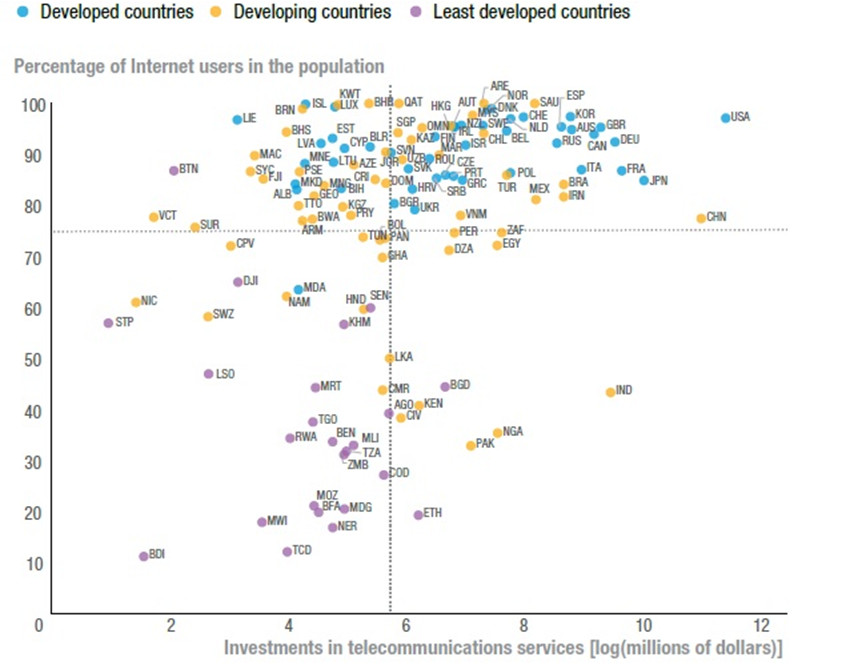
Source: UNCTAD
Many African countries rank among the least prepared for AI globally. In fact, the vast majority of the continent lags significantly in Internet penetration and investments in telecommunications services. In 2024, only 38% of Africans had Internet access compared to a global average of 68%, according to the International Telecommunication Union (ITU). According to Africa Analysis, the total inventory of operational terrestrial fiber optic networks in Africa was about 1,337,158 km, with 112,373 km under construction. However, some North African countries, such as Egypt and Morocco, exceed global averages in Internet penetration and telecom investments, partly thanks to submarine cables. Egypt, due to its geographic position and connections with numerous submarine cable operators, could become a hub linking three continents. The country alone is connected to more than fifteen submarine fiber optic cables. It boasts nearly 90% Internet penetration.
Number of Cloud Infrastructure Services, mid-2024
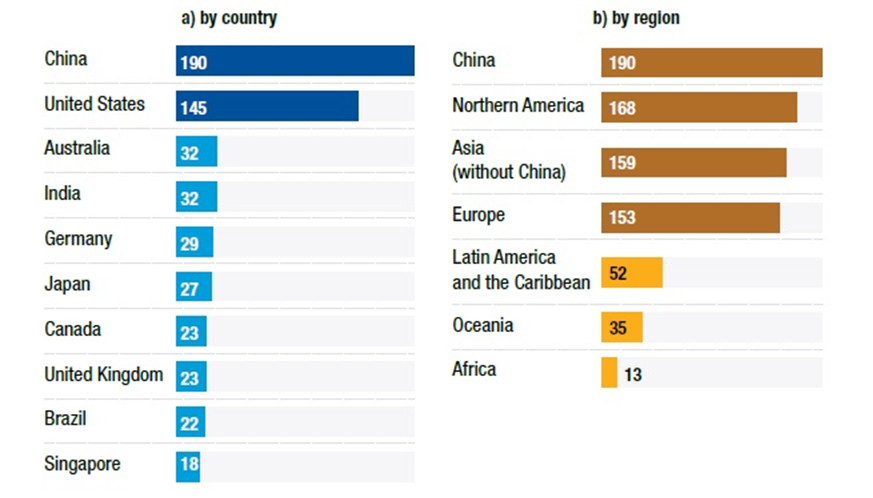
Source: UNCTAD
Africa also lags behind other continents in terms of traffic and participation in Internet Exchange Points (IXPs). Despite its 53 exchange points located in 36 countries, according to the Internet Society, only three countries met the 2010 goal of localizing 80% of all Internet traffic by 2020, with just 20% going through international lines in order to reduce latency and costs.
In terms of cloud infrastructure services, Africa is also behind other regions. South Africa, Kenya, and Nigeria currently host the largest number of data centers on the continent—more than ten centers. Nonetheless, some countries are speeding up digitization, attracting growing interest from investors in data storage and hosting.
Data
Data is essential for training AI models, with dedicated datasets required to apply models to various use cases. Data is not only an input but is also generated by AI systems. Most African countries are considered “laggards” in terms of data readiness for AI, with low potential for adoption and development. The low level of digitization in the majority of African countries deprives the continent of data to feed AI models essential for information analysis. According to the 2024 e-Government Development Index, only two African countries scored very high: South Africa and Mauritius. Seventeen countries had high scores. The remaining thirty-five countries on the continent scored below the global average.
Countries with Internet accessibility favorable for AI
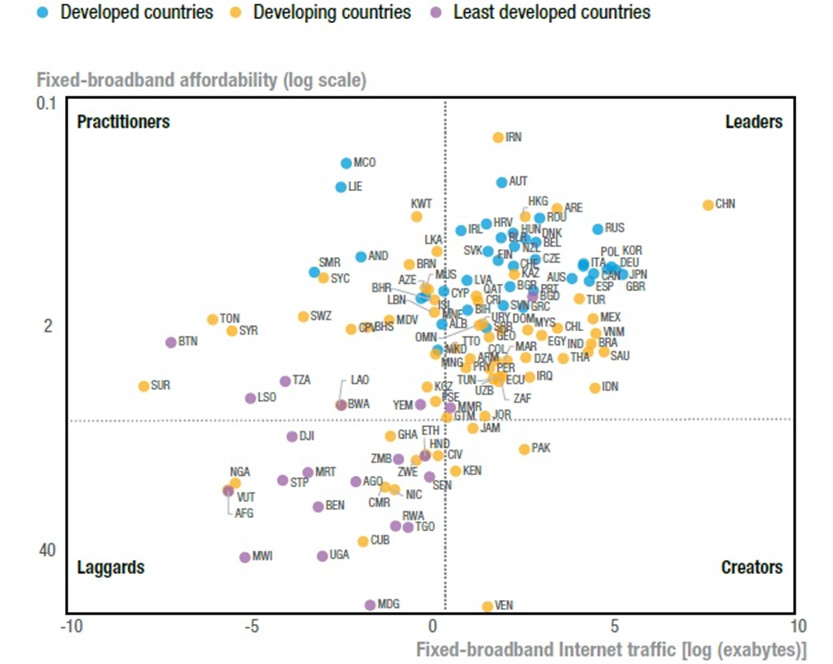
Source: UNCTAD
With regard to fixed broadband data traffic—critical for data flow—Least Developed Countries (LDCs), many of which are African, lag behind other developing nations. In its Mobility Report from November 2024, Ericsson indicates that mobile data traffic will grow by only 21% between 2024 and 2028, rising from 5.4 to 17 gigabits per month. This volume remains well below other regions and even below the global average, which is expected to rise from 19 to 40 gigabits per month.
Internet Exchange Point traffic and number of members, mid-2024
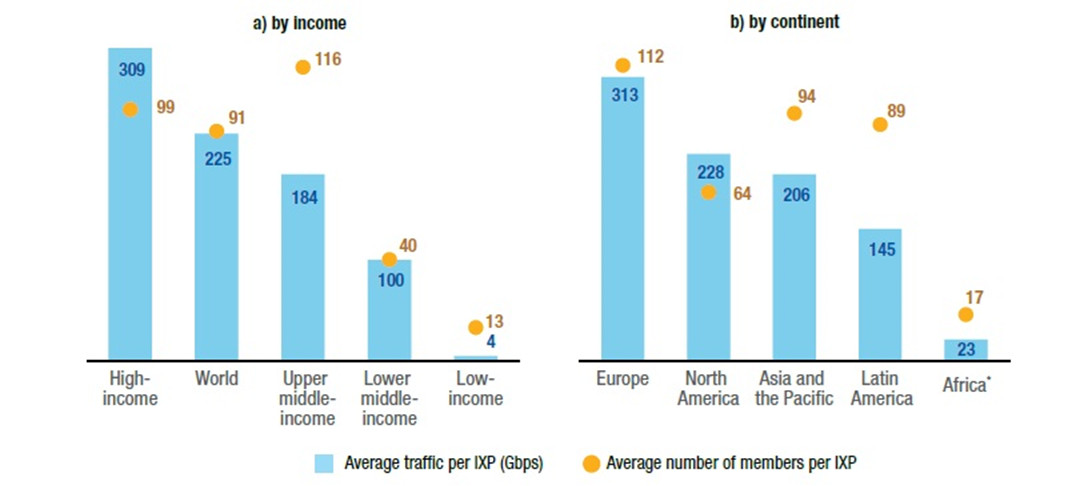
Source: UNCTAD
Delays in Internet exchange points and their transformation also weigh on Internet consumption and data generation.
Skills
On average, LDCs—many of which are in Africa—score significantly lower than developing and developed countries across all dimensions of the Frontier Technologies Readiness Index, with the skills index showing the largest gap.
African countries record relatively low scores in terms of developers per working-age population and in the share of the working-age population with higher education, notes UNCTAD.
Countries with AI-related skills (AI readiness)
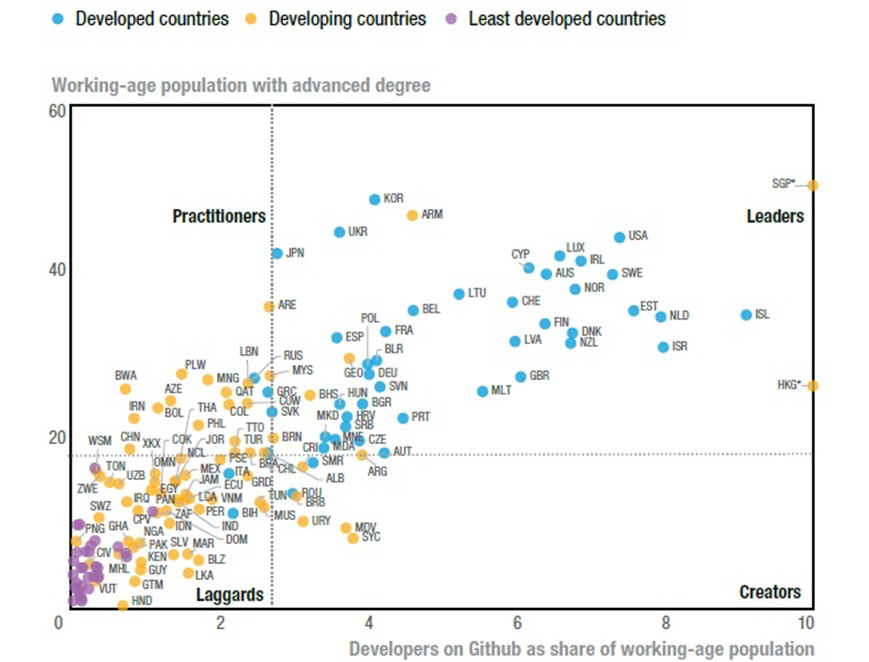
Source: UNCTAD
However, countries like South Africa, Nigeria, Ghana, and Kenya have seen rapid growth in the number of developers, becoming promising hubs for tech companies and fertile ground for tech innovation. Ethiopia and Egypt are also seeing fast growth in the number of people with intermediate and high-level digital skills, thanks to a surge in international partnerships. Private initiatives such as Andela and others backed by major groups like Microsoft, Google, and Huawei also offer hope for Africa’s future workforce.
UNCTAD's report draws a clear conclusion: Africa is currently ill-prepared for the AI revolution. Yet strong signals suggest the continent can catch up by accelerating investments in digital infrastructure, unlocking the potential of data, and scaling up tech skill development. Countries like Egypt, Kenya, and Nigeria are showing the way. If these efforts become widespread, Africa could not only adopt AI, but also become a major player, creating solutions tailored to its unique challenges.
Muriel EDJO
Women in Tech 2025 is set to gather Africa’s leading female innovators at Vodacom World, Johannesburg, for a full day of celebration, inspiration, and empowerment on November 16.
The event, "Join the Shevolution," will showcase female tech entrepreneurs, spotlight their achievements, and open doors to new opportunities. It aims to build a future where women lead and power the technology sector. SHEVOLUTION is a call to action for female entrepreneurs to join Africa’s growing tech revolution.
Highlights include celebrating outstanding women from enterprise development programs, networking opportunities, and access to inspiring industry leaders.
In Burkina Faso, a digital solution is shaking up habits amid persistent medicine shortages in pharmacies. This new platform aims to enhance the traceability and safety of pharmaceutical products in a country where counterfeit drugs remain a pressing issue.
A mobile application developed by Burkinabe firm Nonga Sarl is offering a digital lifeline to those seeking medication amidst persistent shortages in the nation's pharmacies. Dubbed Alliance Pharma, the app empowers users to swiftly pinpoint pharmacies stocking specific drugs, eliminating the need for fruitless travels. Beyond individual convenience, the platform offers health organizations and businesses with digital tools to streamline the healthcare management of their employees and collaborators. Pharmacist Kaleb Kapioko spearheaded the project's launch in 2021.
Available on both iOS and Android platforms, Alliance Pharma has already garnered over 10,000 downloads via the Play Store. To seamlessly connect with pharmacies with their required medications, users need to create an account. This gives them access to a regularly updated database, maintained by partnering pharmacies, where they can conduct rapid searches using either the drug name or its active ingredient. The search results provide details like availability status, pharmacy name, precise location, and contact information.
Complementing its geolocation capabilities, Alliance Pharma features an integrated messaging system, facilitating direct inquiries and real-time confirmation of a medication's availability. Nonga Sarl intends to broaden its network of participating pharmacies and eventually incorporate supplementary functionalities, including online ordering and home delivery services.
Alliance Pharma represents a significant stride in the ongoing digitalization of Burkina Faso's healthcare system, effectively connecting pharmaceutical supplies and the immediate needs of patients.
Adoni Conrad Quenum
- Senegal has adopted a national digital health policy to coordinate health sector digitization and improve service efficiency and data governance.
- A draft digital health law is being finalized to regulate the use, security, and confidentiality of medical data.
- The $150M World Bank–funded PAEN project supports this effort, including expanding electronic patient records to six more regions in 2025.
Senegal has officially adopted a digital health policy framework designed to structure the digitization of its medical sector. Approved on Monday, April 28th, by Health and Social Action Minister Ibrahima Sy, this document aims to integrate digital technologies into healthcare services while enhancing their governance and efficiency.
Speaking about the new framework, Minister Sy stressed the importance of better coordinating the numerous digital initiatives already in progress, which are often implemented in a disjointed manner. A primary goal is to prevent redundancy and optimize resources. He also underscored the urgent need for a strong legal framework to ensure the security and confidentiality of citizens' health data.
In line with this, a draft law on digital health is being finalized and will soon be submitted to the General Secretariat of the Government. This legislation seeks to formally regulate the use of technology within the health system by establishing clear guidelines for the collection, storage, and utilization of medical data.
These initiatives are part of the Digital Economy Acceleration Project (PAEN), a $150 million initiative financed by the World Bank through 2028. PAEN notably aims to strengthen high-speed connectivity resilient to climate risks and to promote the adoption of online public services, including the electronic patient record (EPR).
The program plans to expand the electronic patient record (EPR) to six additional regions starting this year, following a pilot phase conducted in several facilities in Dakar. These included the Abass Ndao and Thierno Birahim Ndao hospitals, the Khadim Rassoul health center, and the HLM Fass health post.
Despite this progress, significant challenges remain. A key concern will be preventing digitization from widening disparities in access to care, particularly in rural or poorly connected areas. The widespread availability of digital tools, the inclusion of the most vulnerable populations, and the training of healthcare personnel will be critical for the success of this transition.
Ultimately, the success of this transformation hinges on robust governance of health data to maintain public trust in these new systems. Therefore, its success will depend on its ability to effectively combine innovation, equity, and security.
Samira Njoya
More...
- Tanzania and Estonia are exploring a deeper digital partnership, focusing on e-governance, ICT, cybersecurity, digital education, and agri-tech.
- The discussions build on the EU-funded Digital4Tanzania project, launched in 2023 with €2 million to support e-government and connectivity reforms.
- No formal agreement has been signed yet, as talks remain at a preliminary stage with no confirmed implementation timeline.
The Tanzanian government is seeking to deepen its collaboration with Estonia in the realm of digital transformation. This was the main focus of discussions held on Monday, April 28th, during a visit by an Estonian delegation to Tanzania's Ministry of Foreign Affairs and East African Cooperation.
Talks between the two sides specifically addressed strengthening e-governance, information and communication technologies, cybersecurity, digital education and training, and agricultural technology. Stimulating innovation among Tanzanian entrepreneurs was also a point of discussion.
This move towards closer ties aligns with the Tanzanian government's ambition to accelerate the nation's digital transformation, positioning it as a key driver of socio-economic development in the years ahead. Estonia already has an ongoing partnership with Tanzania through the Digital4Tanzania (D4T) project, launched in October 2023 with €2 million (approximately $22.3 million) in funding from the European Union. This project aims to support Tanzania's digital transformation by collaborating on e-government reform and connectivity.
Currently, Tanzania holds the 153rd position in the United Nations E-Government Development Index with a score of 0.4327, falling below the global average. While the International Telecommunication Union recognizes Tanzania as a cybersecurity model, the country still needs to enhance its technical measures and capacity development. In contrast, Estonia ranks second globally in e-government development, boasting a score of 0.9727 out of 1. The organization also considers the Baltic nation a global leader in cybersecurity.
"Despite being a small developing country, Estonia has gained global recognition for its digital innovation, particularly in e-governance, digital services, and cybersecurity. Through its partnership with Tanzania, it has strengthened digital governance and promoted economic diplomacy via digital platforms, thereby contributing to societal development," stated Krist Karelsohn, Director of the Asia, Pacific, Middle East and Africa Department in Estonia.
However, it's crucial to note that the projects discussed as part of this potential enhanced cooperation between Tanzania and Estonia are still in the preliminary stages of discussion. No agreement has been signed or officially announced at this point, and no implementation timeline has been provided. Therefore, it is prudent to await the actualization of this partnership before evaluating its prospects and potential impact.
By Isaac K. Kassouwi,
Editing by Sèna D. B. de Sodji
Kaduna State, Nigeria, is advancing AI for public good, reinforcing its commitment to digital transformation, the Ministry of Business, Innovation and Technology announced on April 29.
As part of the AI Governance Peer Learning Tour in Singapore, the Commissioner of Business Innovation & Technology, Mrs. Patience Fakai, and the SA on IT to the Governor, Musa Bello, visited AI Singapore to explore its National AI Strategy.
Inspired by Singapore’s AI Strategy 2.0, Kaduna is advancing AI adoption by integrating it into vocational training and supporting local researchers through state institutions. As part of this effort, the State is establishing an AI Centre of Excellence to strengthen governance, improve infrastructure planning, enhance national security, and drive AI research.
- Tanzania collected $71.5 million in digital tax revenue from 1,820 online businesses, mainly in betting, between July 2024 and March 2025.
- A national e-commerce strategy is being finalized to modernize regulations, boost tax collection, and support digital sector growth.
- Digital services are taxed under a robust framework, including a 2% DST, 3% withholding tax, and 18% VAT on electronic services.
Between July 2024 and March 2025, the Tanzanian government collected 192.78 billion Tanzanian shillings (approximately $71.5 million) in tax revenue from 1,820 businesses operating online, with the digital betting industry being the primary contributor. Deputy Minister of Industry and Trade Exaud Kigahe disclosed these figures in Parliament on Wednesday, April 29th.
During the same parliamentary session, Kigahe announced that Tanzania is in the final stages of developing a national e-commerce strategy. This plan seeks to adjust the regulatory environment to the evolving digital marketplace and to optimize tax revenue generated by this rapidly expanding sector.
Key components of the strategy include bolstering information and communication technology infrastructure, revising current public policies and regulations, and enhancing communication, transportation, and logistics services. It also underscores the importance of securing online transactions and increasing public awareness regarding the adoption of digital platforms.
This strategy will align with the existing tax framework governing digital services. Since July 2022, Tanzania has implemented a 2% Digital Services Tax (DST) on non-resident providers of electronic services, in addition to a 3% withholding tax on platforms facilitating transactions. These services are also subject to an 18% VAT. This framework is designed to ensure the fair taxation of locally generated revenue, particularly from foreign entities.
Through this strategy, Tanzanian authorities aim to stimulate the use of online commerce, enhance tax collection, and combat undeclared digital activities. The government's challenge now will be to solidify this growth while addressing the risks associated with the digital sector, particularly in sensitive areas like online gambling.
By Samira Njoya,
Editing by Sèna D. B. de Sodji
Since the COVID-19 pandemic, online learning has become increasingly popular in Africa. Capitalizing on this trend, a Senegalese startup is using its mobile application to broaden access to education.
Yello, an edtech solution developed by a young Senegalese startup, provides students in grades 10, 11, and 12 with access to practical course summaries in both text and audio formats. The Dakar-based startup was founded by Stéphane Mancabo, Mohamed Aly Sidibe, and Abdoulaye Ndiaye.
"At Yello, our vision is to reinvent education in Africa by making it accessible, interactive, and personalized through digital solutions tailored to each student," the startup stated. "We aim to break down barriers to learning by providing a supportive and engaging environment that fosters growth, curiosity, and success for high school students across the continent."
The mobile application is available on both iOS and Android platforms, with over 10,000 downloads on the Play Store alone. However, the startup reports a community exceeding 80,000 students, with over 2 million hours of audio content listened to and a baccalaureate success rate of over 89% among its users.
To access Yello's content, users need to download the application from either the Play Store (Android) or the App Store (iPhone). After creating an account, they gain access to the app's free content. For more in-depth features and additional resources, a paid subscription option is available.
The edtech platform includes more than a thousand course summaries, quizzes and exercises for tracking progress, audio lessons, revision sheets, and tips and methods designed to reinforce knowledge and promote academic excellence. Recognizing connectivity and cost limitations, particularly in rural areas, Yello also offers an offline mode, allowing users to learn at their own pace without requiring constant internet access.
Incubated within Teranga Tech and supported by the Orange Corners Dakar program, the startup is also leveraging an integrated referral system to enhance community engagement and expand its user base. By strategically using audio as a tool for inclusivity, Yello aligns with the growing number of African edtech companies that are reimagining learning to address local needs and realities.
By Adoni Conrad Quenum,
Editing by Feriol Bewa


